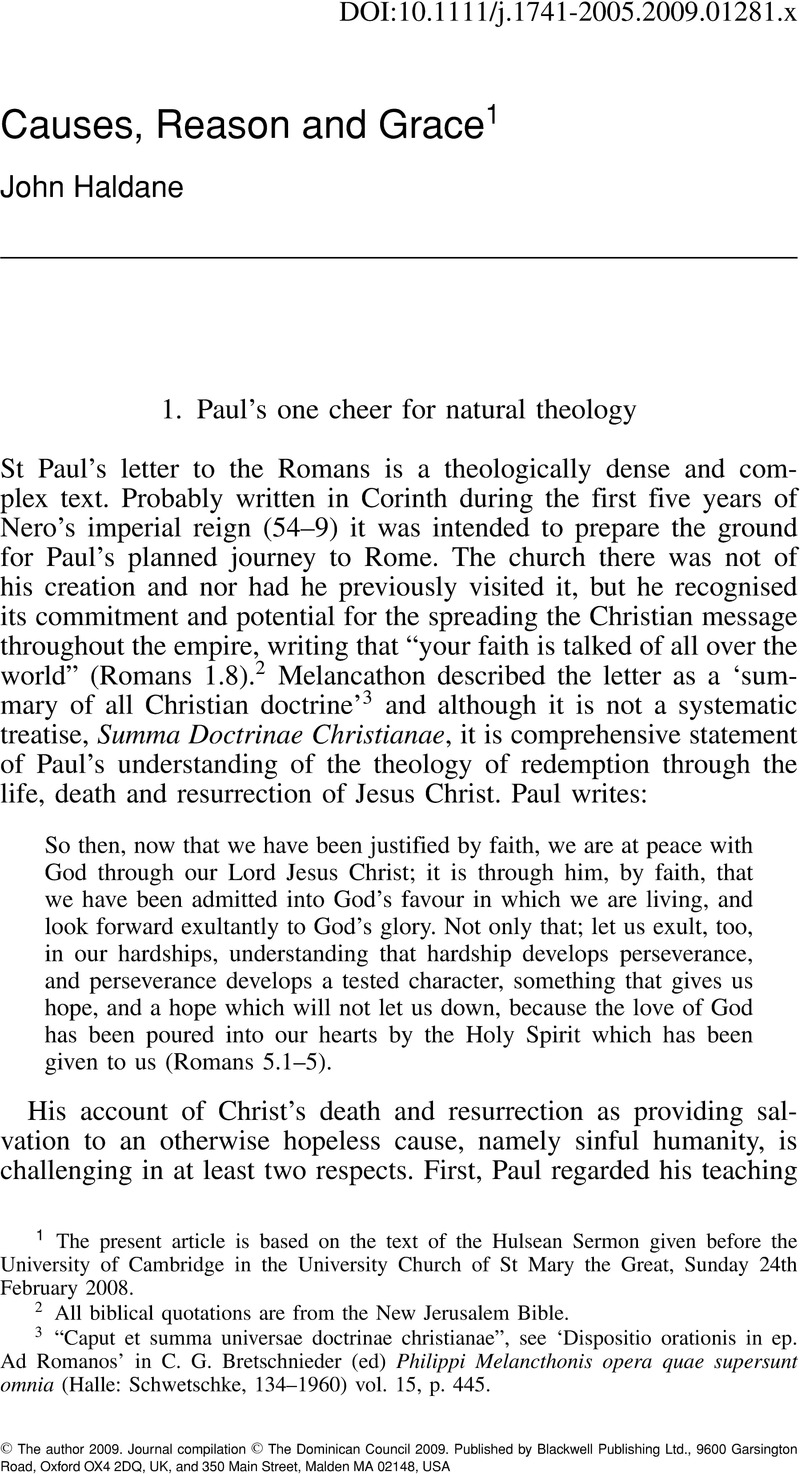No CrossRef data available.
Article contents
Causes, Reason and Grace1
Published online by Cambridge University Press: 01 January 2024
Abstract

- Type
- Original Articles
- Information
- Copyright
- Copyright © The author 2009. Journal compilation © The Dominican Council 2009
Footnotes
The present article is based on the text of the Hulsean Sermon given before the University of Cambridge in the University Church of St Mary the Great, Sunday 24th February 2008.
References
2 All biblical quotations are from the New Jerusalem Bible.
3 “Caput et summa universae doctrinae christianae”, see‘Dispositio orationis in ep. Ad Romanos’ in Bretschnieder, C. G. (ed) Philippi Melancthonis opera quae supersunt omnia (Halle: Schwetschke, 134–1960) vol. 15, p. 445Google Scholar.
4 See Walsh, P. G. trans. Cicero, , The Nature of the Gods (Oxford: Clarendon Press, 1997)Google Scholar, Book 2, para 4, p. 48.
5 It appears as the last line of the sole surviving quatrain of the poem:
They fashioned a tomb for thee, O holy and high one
The Cretans, always liars, evil beasts, idle bellies!
But thou art not dead: thou livest and abidest forever,
For in thee we live and move and have our being.
As further evidence of Paul's familiarity with Greek ‘theological’ writings, he quotes the second line in Titus 1. 12: “It was one of themselves, one of their own prophets, who said, ‘Cretans were never anything but liars, dangerous animals, all greed and laziness’”. The first identification of Paul's reference is made by Clement of Alexandria, Stromata, Book 1, ch. 14: ‘Epimenides the Cretan, whom Paul knew as a Greek prophet, whom he mentions in the Epistle to Titus, where he speaks thus: “One of themselves, a prophet of their own, said, The Cretans are always liars, evil beasts, slow bellies. And this witness is true.” You see how even to the prophets of the Greeks he attributes something of the truth, and is not ashamed, when discoursing for the edification of some and the shaming of others, to make use of Greek poems’.
6 “From Zeus let us begin; him do we mortals never leave unnamed; full of Zeus are all the streets and all the market-places of men; full is the sea and the havens thereof; always we all have need of Zeus. For we are also his offspring”, Aratus Phaenomena, lines 1–5, from Callimachus, Hymns and Epigrams. Lycophron. Aratus. Translated by W., Mair, A. & G. R., Loeb Classical Library Volume 129 (London: William Heinemann, 1921)Google Scholar lines 1–5.
7 Chesterton, G. K., What's Wrong with the World (London: Cassell, 1910) p. 194Google Scholar.
8 See Dawkins, Richard, The Blind Watchmaker (New York: W.W. Norton, 1996)Google Scholar.
9 See the case for and defence of theism in Smart, J. J. C. and Haldane, J. J. Atheism and Theism second edition (Oxford: Blackwell, 2002)Google Scholar.
10 For further discussion of this important issue see Haldane, John, ‘Finding God in Nature: Beauty, Revulsion, and Contemporary Art’ in Titus, Craig (ed) Christianity and the West (Washington, DC: Catholic University of America Press, 2009)Google Scholar.




